Long read: How do we build dignity, agency & power together?
 Niall Cooper, director of Church Action on Poverty, asks: How do we build dignity, agency and power together as a society?
Niall Cooper, director of Church Action on Poverty, asks: How do we build dignity, agency and power together as a society?
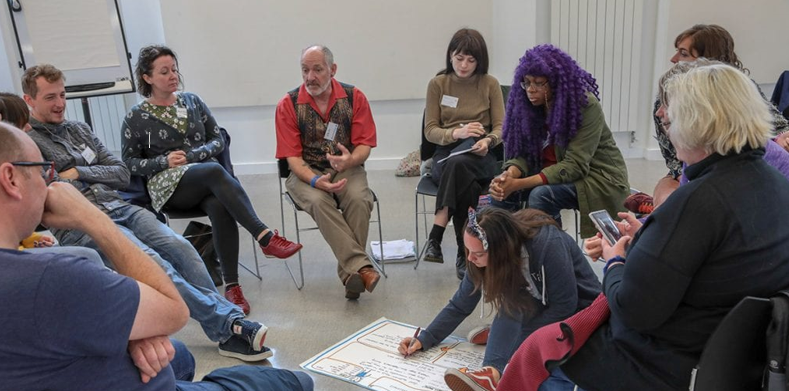
Introduction
Church Action on Poverty’s vision is that the UK can and must be transformed into a country where everyone can live a full life, free from poverty. Poverty robs people of dignity, agency, of power over their own lives. We believe our vision – an end to poverty in the UK – can become a reality.
Our goal through this decade is to contribute to building a social movement based on organising with people and communities struggling against poverty, to create the social and political space to reclaim dignity, agency and power.
I have been director of Church Action on Poverty for 25 years, and will reflect here on our experiences of trying to develop a variety of practical organising, empowerment and advocacy programmes, and look ahead to new paths.
Our context: the denial of dignity, agency and power
The task of organising is indeed difficult in the current context. There is little immediate prospect of significant policy action to tackle poverty at UK level, with a Government with an 80-seat majority in Parliament.
More widely though, the Covid-19 pandemic and the recent steep rise in living costs have brought into much sharper focus pre-existing inequalities in society, and also led to dramatic increases in poverty, debt and levels of unemployment (especially for people under 25), which are significantly worse than that following not just the 2007 global economic crash, but the deep recessions of the 1970s and 1980s.
For all the talk of ‘building back better’, this leaves many families and communities with the prospect of reduced life chances (and indeed, life expectancy) for years to come.
Beyond this, there are strong and deep seated public attitudes in the UK which stigmatise and blame individuals for their own poverty.
Professor Ruth Lister describes this in terms of the ‘othering’ of people living in poverty. Over many decades, these attitudes have not only been embedded in the welfare system, but have also been internalised by many people living in poverty themselves.
In the words of Wayne Green, who spoke at the first National Poverty Hearing we held back in 1996:
“What is poverty? Poverty is a battle of invisibility, a lack of resources, exclusion, powerlessness… being blamed for society’s problems”
To be clear also, the Churches have not been immune from these attitudes, from treating poverty as a problem to be addressed through individual behaviour change, or in more theological language ‘saving’ people from their self-inflicted poverty.
This is the context in which poverty – and even many attempts to tackle it – rob people of their dignity, agency or power over their lives.
In spite of this, Church Action on Poverty affirms the belief in the transformational possibilities of people coming together to reclaim their dignity, agency and power.
Dignity
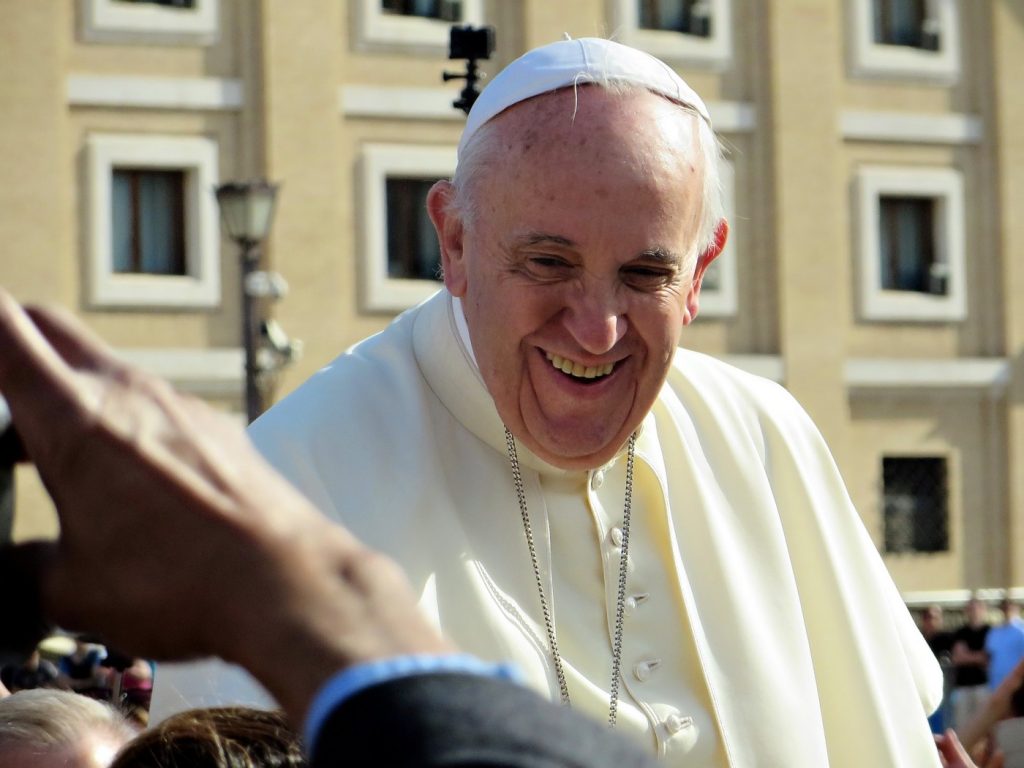
For Christians, the centrality of human dignity is based on the foundational theological principle that all human beings are created in the image and likeness of God.
Maria Power states that Pope Francis’ recent encyclical, Fratelli Tutti, “offers a new vision of society in which human dignity and the human rights of all are respected…He has always wanted to make it clear that his papacy is one of action – placing the needs of the poor, marginalised and disenfranchised at the centre of his ministry.”
According to the United Nations, poverty is not only deprivation of economic or material resources but a violation of human dignity too.
The concept of human dignity is based on a particular pattern of perception: of perceiving humans as beings rather than things. The thing about dignity, and the reason it is a transformational concept, is that it knows no social, economic, gender or ethnic barriers.
Dignity is not something that can be given, but it is very definitely something that can be taken away. This is not just a question for the way the state interacts with its citizens, for employers, the media or society at large, but it is also a question we have to address to ourselves.
Agency

To be truly human means being invested not only with dignity, but also with agency. Agency is about people’s ability to act individually or collectively to further their own interests. Agency is tricky.
People on the right seek to blame people for their own poverty, without understanding the wider forces which come into play on peoples lives to restrict their agency to act. People on the left can focus so much on structural forces that create poverty and inequality they risk denying people any agency to change anything.
In Church Action on Poverty’s experience, people who struggle against poverty on a daily basis have far greater insight not just into the challenges they face, but a really deep understanding of what needs to change, and some of the best ideas for doing so.
In my experience, there is nothing more transformative than enabling a group of people to bond together, through sharing their own experiences and ‘truths’ about poverty, and to discover that these are not ‘personal’ problems, but shared experiences – and then to generate ideas and take action to address them together.
This process of empowering people to ‘create their own space’ for reflection and action, is the heart of enabling people to reclaim a sense of agency, not just over their own lives, but to start to challenge and change the wider decisions, institutions and attitudes which so often constrain or negatively impact on them.
Power
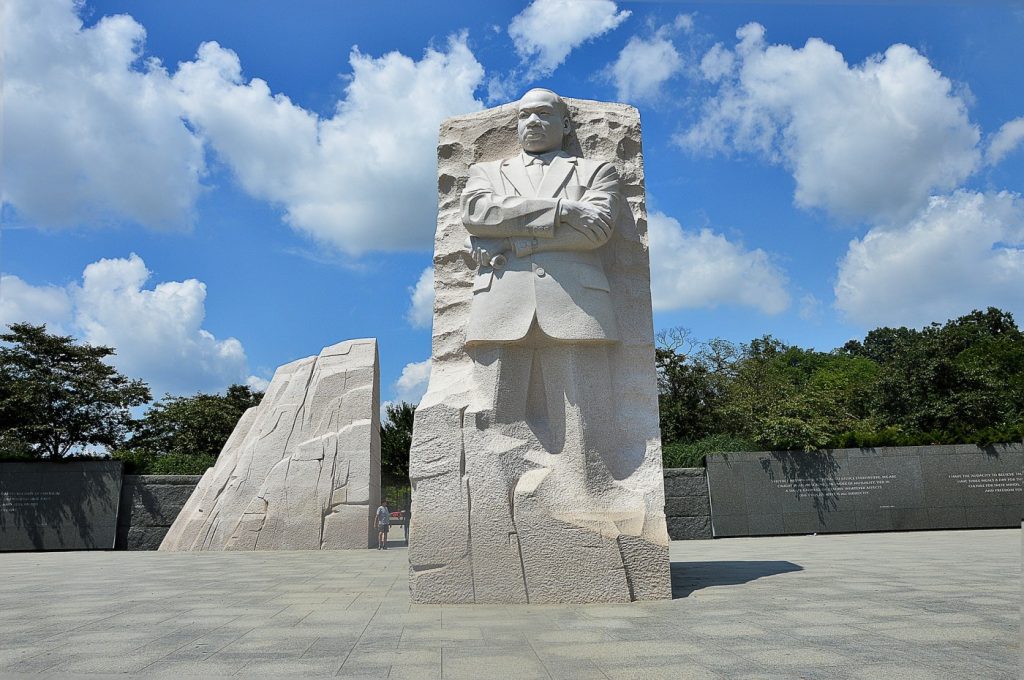
I frequently find that people both in the churches and the voluntary sector have a problem with the idea of power. It makes us uneasy. But I’m reliably told that there are more references to power in the Bible than to prayer.
What is power, other than, in Martin Luther King’s words “The ability to achieve a purpose… It is the strength required to bring about social, political, and economic change.”
We like to focus more on loving our neighbours, than on wanting to claim or challenge power. But again, Martin Luther King challenges us to think differently: “Power without love is reckless and abusive, and love without power is sentimental and anaemic. Power at its best is love implementing the demands of justice, and justice at its best is power correcting everything that stands against love.”
Transforming unjust structures is core to the mission of the church, but if we are serious about transforming the unjust structures then we have to be willing not just to speak truth to power, but to enable people to do so for themselves.
We need to talk more about race, class and poverty
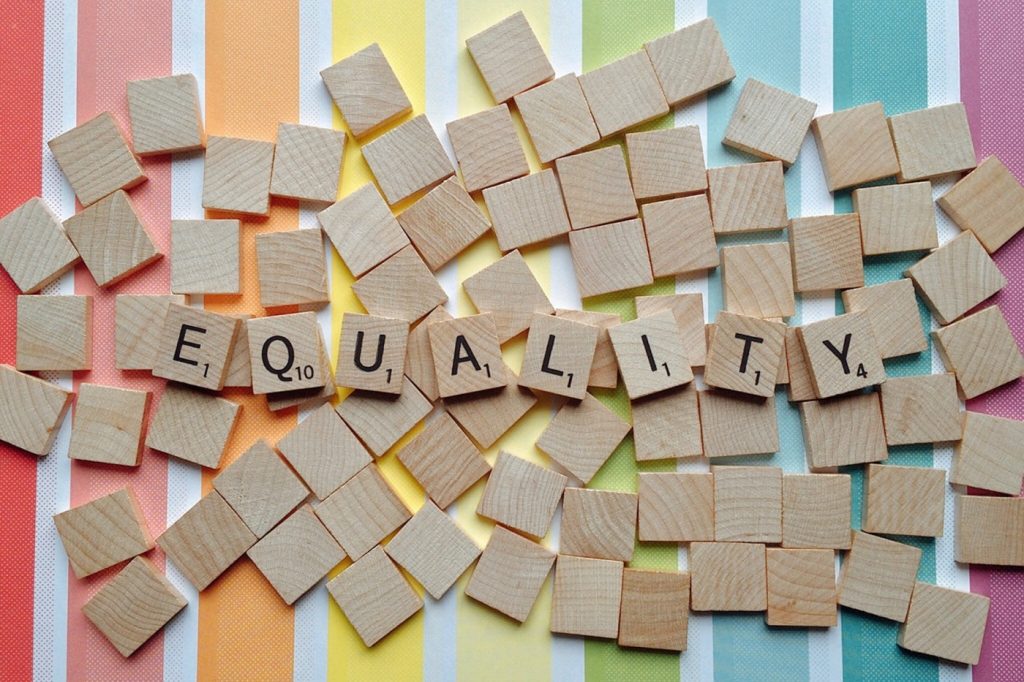
One of the key insights of the past few years is that we are not all in the same boat – and that poverty intersects with other social inequalities. If we didn’t already know this, the pandemic and the Black Lives Matter movement have brought this home with greater sharpness.
Black people are disproportionately affected by poverty, by low pay, by poor housing, by health inequalities. These are aspects of structural racism which impinge directly on peoples lives.
We have not done enough in the anti-poverty movement, in the churches – and within Church Action on Poverty ourselves, to acknowledge this fact, and to ensure that the views, voices and experiences of black and brown people are visible, or heard in and through our work.
But equally, poverty intersects with inequalities in relation to social class, gender and disability. The way we frequently talk about these are as if they were separate categories of experience, but in reality, they are complex and interlocking injustices and inequalities that exacerbate poverty for specific groups of people.
We cannot hope to create solidarity by glossing over the differences. Rather, the challenge is to build solidarity among people by affirming their specific experiences.
What does this mean in terms of what we do?
None of these are abstract ideas.
Too often, poverty is discussed in the abstract. For Church Action on Poverty, this has never been our way. For us, making change happen must always start at street level, at local level, by working with small groups of people to enable them to reclaim their own dignity, agency and power.
Our vision for building a social movement is rooted in this approach – finding ways to enable groups of people to come together in ways which are transformative.
To paraphrase Margaret Mead, that’s the only way that true and lasting change has ever come about.
So our vision for building a social movement is still rooted in building the capacity and skills of a network of local leaders – to equip people and communities to come together.
I now want to share some examples of how we do this in different ways and at different levels, which I will describe for the purpose of this talk as community self-organising, organizing at town or city-wide level, speaking truth to power nationally, and congregational organizing – or becoming a Church on the Margins.
Community self-organising
We know change can happen when small groups come together. I want to outline two examples here.
Self-reliant groups
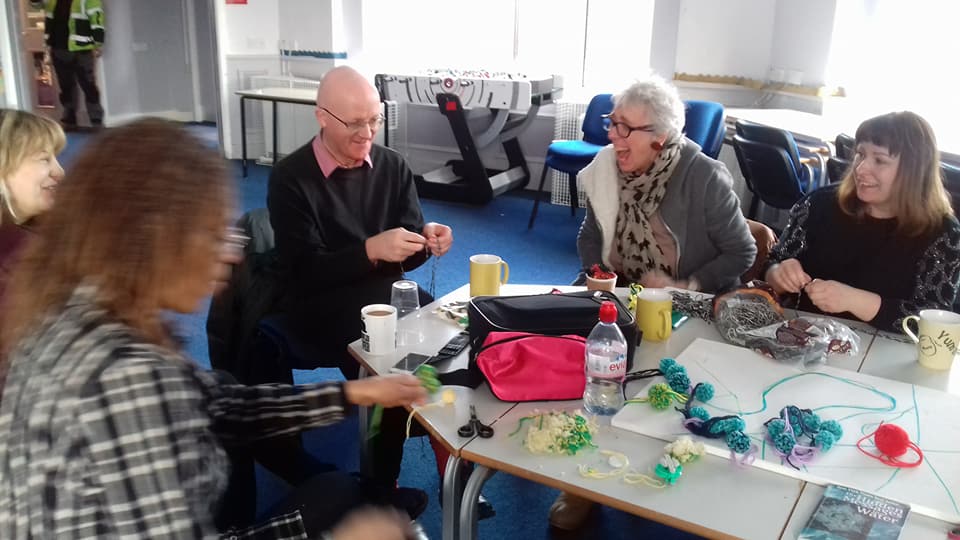
The most small scale level at which we promote organising is through Self Reliant groups. Taking inspiration from the ways in which some of the poorest people in India manage to survive and thrive, 10 years ago the Church of Scotland decided to see how working in groups could change communities for the better.
Following a visit to see the Self Reliant Groups movement in India, in 2011, a group of women came together as its first self-reliant group (SRG) and looked at how they could generate their own capital. Through small savings, they started a lunch club, raised money and eventually started their own laundry business.
Today there are almost 100 SRGs supported by Church Action on Poverty and four partner organisations in Scotland, England, Wales and the Netherlands each with its own achievements and stories.
Each group, typically of 6-8 women, meet and save together on a regular basis, and use their own skills of creativity, craft-making, cookery etc to produce and generate small amounts of money – effectively creating their own micro-businesses. This video explains how they work:
The social impact of SRGs for people who are very economically disadvantaged, mostly women, and from very diverse ethnic backgrounds are very powerful in terms of creating a strong social solidarity amongst their members, in which their own skills, ideas and creativity is affirmed, and through which they can become producers rather than just recipients, and collectively have control of small might seem amounts of money – maybe £200 or £300 – that they themselves have generated.
The links between SRG groups are also important, with regular local peer gatherings, and national gatherings (when possible), so that each small group feels strongly connected to other groups as part of a wider SRG movement.
Your Local Pantry
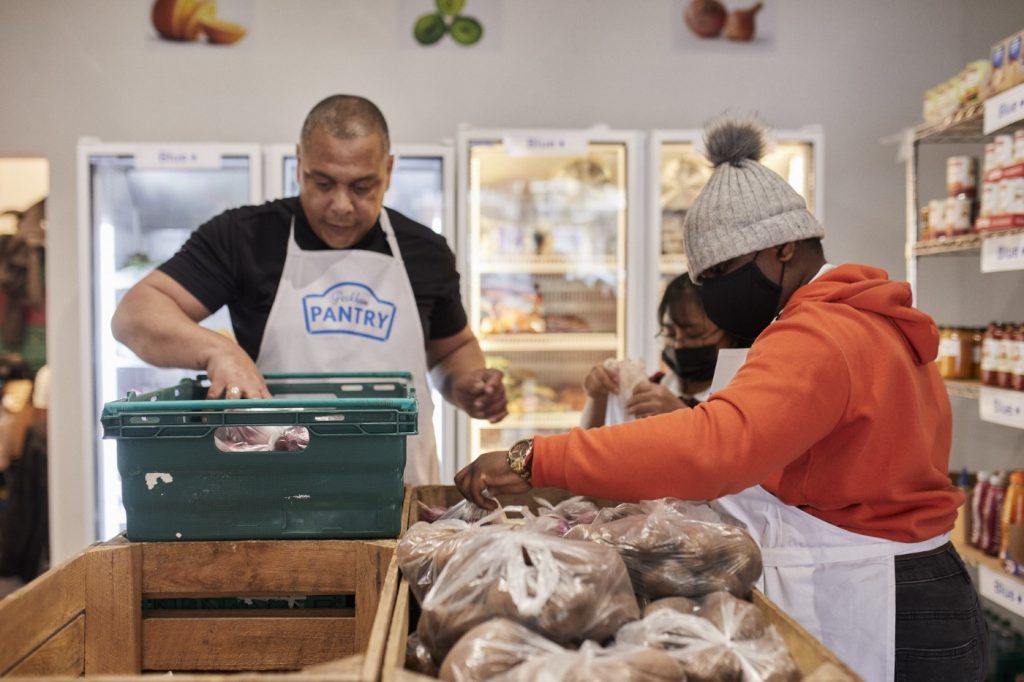
Since 2017 we have been also working on a second approach to community-level organising, by growing a network of Local food pantries – social supermarkets – across the UK.
Each Pantry is hosted by a local community organisation – some are in high street shops, but increasing numbers are hosted by local churches, community centres, schools, even public Libraries
This work has expanded rapidly as a response to the Covid 19 pandemic and soaring living costs. We will shortly be welcoming the 80th Local Pantry into the network, and have tens of thousands of member households, between all four nations of the UK.. This video, filmed at two of the Edinburgh Pantries, explains a bit more about what makes them so effective:
What sets Local Pantries apart from the foodbanks which many churches have opened in recent years are that they are
- Member-run: Pantries are run along co-operative lines, by and for their members, many of the volunteers who run the Pantry are members too. Members pay a small weekly fee, so have a genuine stake in their Local Pantry
- Open to all: Membership is open to anyone local neighbourhood, with no requirement to be referred by a professional or other person.
- Quality: Local Pantries are deliberately created with the look and feel of a little local shop, and with a strong emphasis on good quality food, including fresh fruit and vegetables, frozen and chilled food, including meat and dairy products, alongside the usual supplies of tins and packets that you would find in a foodbank.
In 2021, we carried out a survey of the social impact of being a Pantry member and produced an impact report. We gave this the title ‘Dignity, choice hope.’ This demonstrated that the impact of being a Pantry member extends far beyond simply access to food. Every Pantry member is able to save at least £15 on their weekly food shop, which equates to an annual saving of up to £780 a year. Beyond this
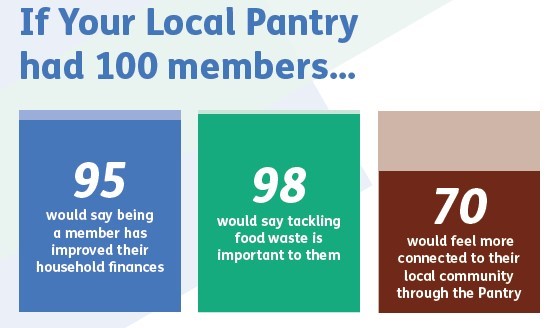
In the midst of the dark times, the Your Local Pantry network, offers a beacon of hope, demonstrating that local communities can be at the forefront of developing practical and sustainable long-term responses to the current crisis.
That’s why we are now partnering with the Co-op nationally, to treble the size of the Your Local Pantry network within the next three years.
What could that mean for your community? You can find out in more detail here:
Re-oxygenating local democracy: organising at town or city level
I now want to turn to two examples of organising that enable groups of people struggling against poverty to engage directly with and exercise some agency and power in relation to Government and other public and private institutions that exercise significant power over their lives at town or city-wide level.
Poverty Truth Commissions
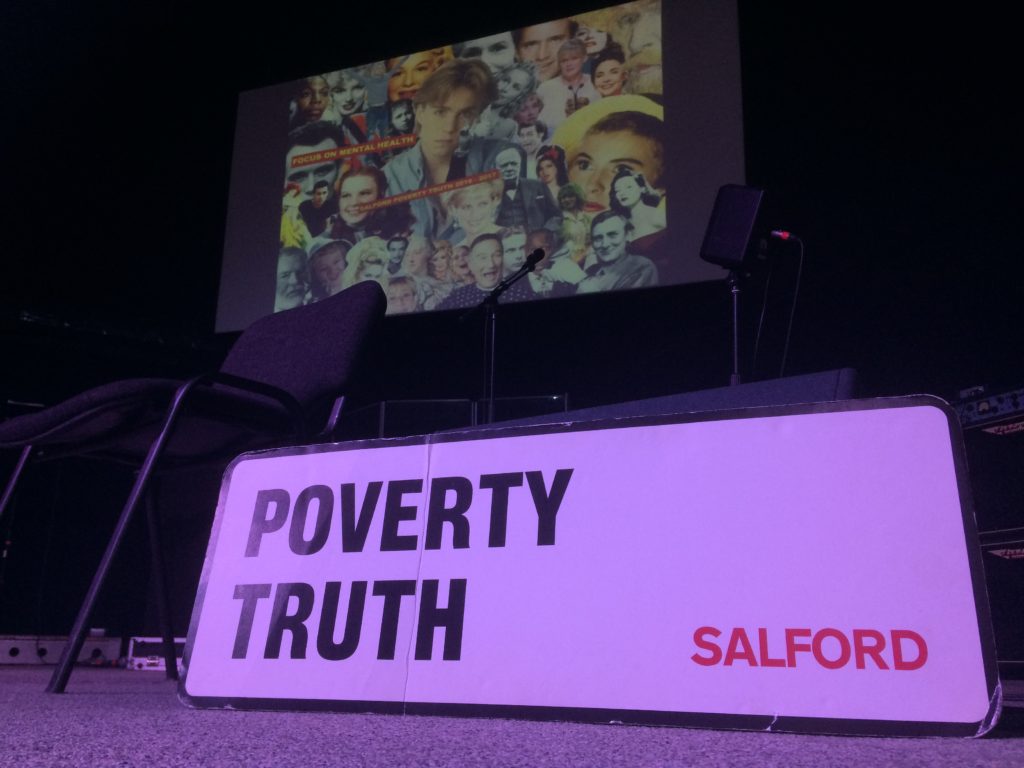
The Poverty Truth Commission is a unique way of developing new insights and initiatives to tackle poverty, developed in Glasgow ten years ago, and now being replicated in more than a dozen towns and cities across the UK. The key principle behind a Poverty Truth Commission is that decisions about poverty must involve people who directly face poverty: Nothing About Us Without Us is For Us.
The Commission process is one of deep listening, relationship building, and shared reflection over a 12-18 month period between people with a direct experience of poverty and civic and business leaders within a town or city.
A few years ago, I co-facilitated the Salford Poverty Truth Commission in Greater Manchester, which was sponsored by the Bishop of Salford and the Salford’s City Mayor, and which brought together 15 civic and business leaders with 15 people from across Salford who each had their own personal experience of and ‘truth’ about poverty to share.
In preparing for the launch, the ‘grassroots’ Commissioners jointly produced a graphic map of the key issues and problems they experienced living in poverty in the City. Slap bang in the middle of the map was an image of Salford Civic Centre.
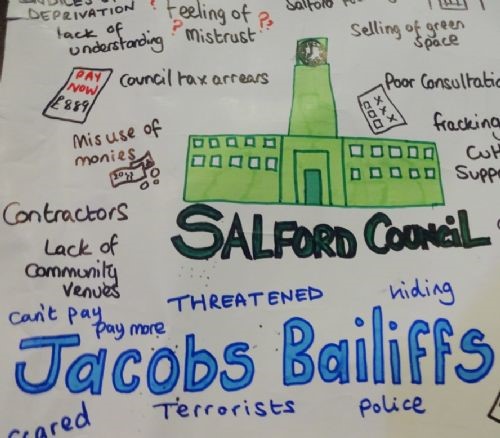
Debbie Brown, who represented Salford City Council on the Commission, recalled her reaction to seeing this at the launch: “The thing that stopped me in my tracks was a picture of Salford Civic Centre – the City Council was identified as cause of poverty. I was devastated! I hadn’t expected to see that at all!”
As the Commissioners shared their stories over the coming months, what transpired was that several of the grassroots Commissioners had traumatic experiences of bailiffs arriving at their front door, sent by Salford Council with the power to seize and sell their property to repay their Council Tax debts. One Commissioner told how a Council Tax debt of less than £100 had grown to over £1,000 once court charges and bailiffs fees had been added, putting her deeper into debt.
As Debbie said, “We heard some real heartbreaking stories of hiding behind sofas and being afraid of what was going to happen: that was not the city I recognised and certainly not the Council I know”.
In response to this, the Poverty Truth Commission brought together several of the grassroots Commissioners with the head of Council Tax collection in Salford, who was ultimately responsible for sending the bailiffs in. At the workshop he carefully explained the process for sending out reminder letters to those who hadn’t paid their bills.
Patrick, one of the grassroots Commissioners said “Yes, I remember those. They came in brown envelopes, and go straight into the draw. I can’t open them. I suffer from ‘brown envelope’ syndrome.”
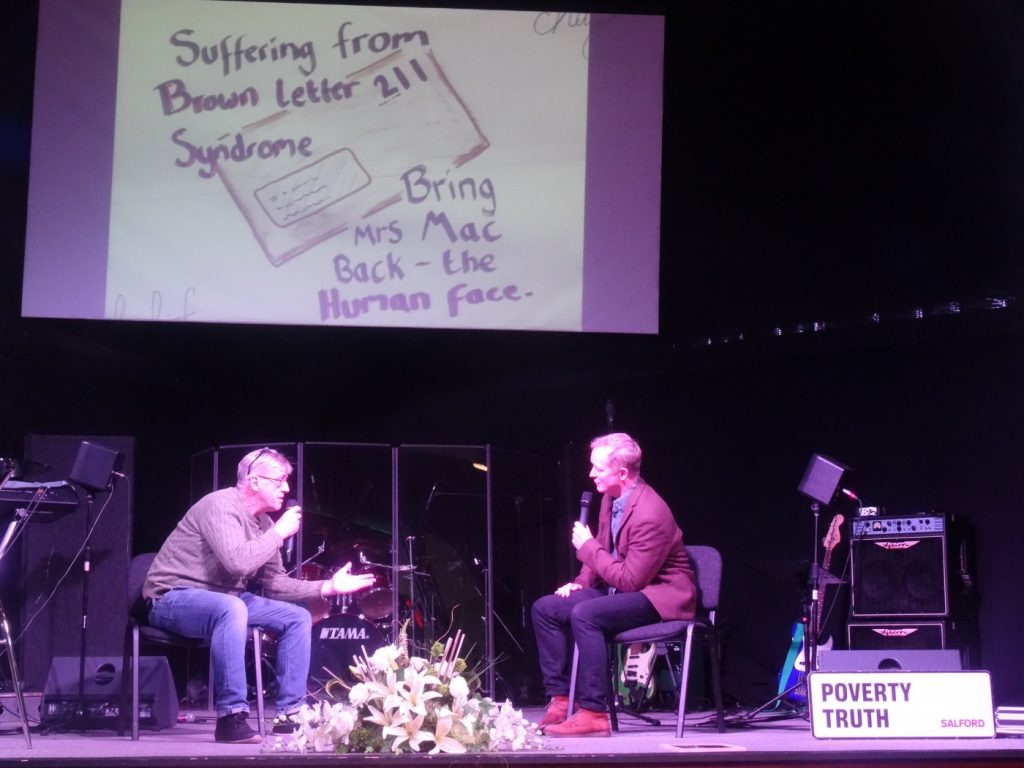
The most shocking revelation from the workshop was that the first point of human contact that anyone would have in the process was the bailiff sent to your house to seize and sell your property.
Patrick’s reaction to this was the key to changing Council thinking. “Back in the day, in Ireland, if I had any problems with the council, I would go and see Mrs Mack. That’s what we need to get back to. Salford needs its very own Mrs Mack.”
This lead directly to significant changes to Salford’s debt collection process – including swapping brown envelopes for white envelopes.
As Debbie now says: “…The City Council has changed a lot already, towards a more person centred approach – we now run coffee morning drop-in sessions for any Salford resident who wants to talk through any problems with Council Tax face to face – and we have stopped using bailiffs to collect Council Tax debts from people on low incomes.
Through the Poverty Truth Commission, the collective wisdom and insights of a group of people sharing their own personal ‘truths’ about poverty has kicked started a process of culture change at Salford City Council, towards a much more human and people-centred approach to engaging with its citizens.
“I am not naïvely thinking we can change the world overnight, but if anybody anywhere else needed motivation, just look at what we have achieved in Salford.”
Participatory budgeting
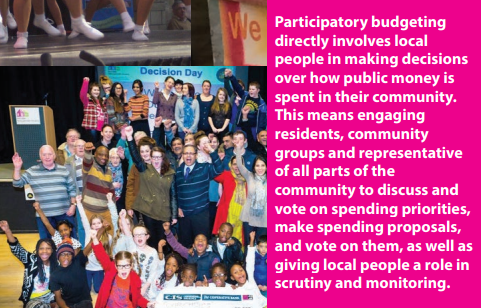
I also want to briefly mention Participatory Budgeting: a process of participatory deliberation and decision-making over the allocation of ‘our’ public funds.
The idea was originated by the Brazilian People’s Party in the city of Porto Allegre in the 1980s. Church Action on Poverty, along with Oxfam, was responsible for introducing Participatory Budgeting to the UK.
For more than ten years until 2012, Church Action on Poverty hosted a Participatory Budgeting Unit, and worked in partnership with central Government, to assist and advise more than 120 local Participatory Budgeting processes, in which local people directly decided how to spend pots of public funding ranging from a few thousand pounds up to tens of thousands of pounds.
Our Peoples Budget campaign promoted the idea that all public bodies should allocate one percent of their funds using Participatory Budgeting.
The Scottish Government has now adopted this policy, which will eventually mean that £100 million of funds spent by local authorities across Scotland will be allocated directly according to the wishes and votes of local people.
Speaking truth to power: organising nationally
Church Action on Poverty has been known for prioritising and amplifying the voices people in poverty nationally since the late 1990s. It is more authentic for people to speak their own truth to power than for church leaders, or me as a director of a charity, to speak on their behalf.
Over the years we have run high profile national campaigns on asylum, debt, Living Wages, tax avoidance but have focussed much of our work over the past six years on the subject of food poverty.
Rather than focus on our campaigns, I would like to share the story of one young campaigner, who has been an inspiration to me in recent years.

Tia Clarke, is a young activist from Blackburn in the North West of England, who has just turned 18, but was 15 when she first started her engagement with us.
Tia and other members of her local child food poverty campaign group have been instrumental in the national #ENDCHILDFOODPOVERTYCAMPAIGN.
They are no strangers to campaigning as their involvement is a result of their own campaign in their home town of Blackburn. This campaign was based on experiences at their school where they and their friends living in food poverty often went without meals.
Their hunger led to a lack of concentration in the classroom and tempers flaring with teachers and classmates. With 40% of children growing up in food poverty in their local area, they could see where the system was failing them and set out to fix it.
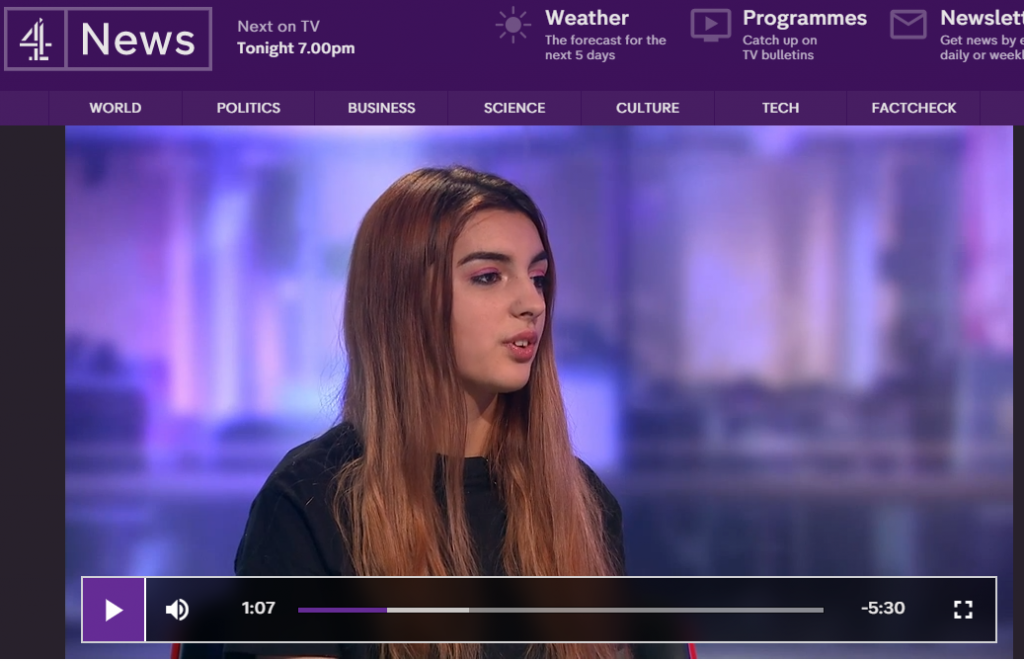
In Tia’s own words
“Food poverty happens all around me. When you are hungry you get in a mood. Then you are in a mood all day and you just want food. To tackle food poverty schools should get more involved, they should look at pupils’ personal experiences and the Government should help as well.
“I became involved in the Blackburn with Darwen Food Alliance which is part of Church Action on Poverty’s Food Power programme in October 2017. Since then I have shared my own experience of food poverty both locally & nationally, and was one of a small group of young people who set up the #DarwengetsHangry Campaign.
In 2018 I became involved in the national Children’s Future Food Inquiry. This has involved speaking to MP’s in Westminster, appearing on Channel 4 News, as well as being featured in national newspapers.”
The #ENDCHILDFOOD POVERTY campaign has received national profile, and in the past nine months has twice forced Boris Johnston to U-turn and agree to provide Government funding for children who would normally receive free school meals, but who have not been able to do so because their schools were closed due to the pandemic.
You can see Tia on Channel 4 News here:
A huge strength of this campaign has been the power of authentic voices of experience.
We know that people who have lived the reality of any issue have the most meaningful and powerful insights into how to solve it.
Partly driven by this knowledge, Church Action on Poverty is now leading on a new Speaking Truth To Power programme.

We know that change happens when people come together and demand it, and when people are focusing on issues of their own genuine priorities.
This exciting new programme will help that to happen, by supporting people with direct experience of issues to take action on the root causes of poverty in the UK.
The programme will bring together people with a diverse range of direct personal experiences of poverty to speak truth to power both locally and nationally, and will work together to access and share tools, training and opportunities, so people can unleash their own power.
Participants will develop the skills, training and support to speak confidently and powerfully to local and national media, politicians and other power-holders. As people become effective campaigners and spokespeople in their own right, we hope they will inspire others to action.
Investing in becoming a church on the margins


Turning lastly to the question of ‘what has all this got to do with the task of being Church? Over recent years we have been exploring more directly the challenge to the church of what it would mean to respond in practical and tangible ways to Pope Francis’ challenge to be or become a ‘Poor church of and for the poor.’
We recently produced two powerful, compelling reports that make challenging but insightful reading.
The first reveals that low-income neighbourhoods are being disproportionately affected by church closures, charting data over a 10-year period. The second looks at what it really means to be a church on the margins, drawing on in-depth conversations with many people and communities.
Churches, at their best, are thriving hubs at the heart of their neighbourhoods. If national church leaders will reinvest instead in low-income areas instead of retreating, they can again help whole communities to thrive and build better futures.

Part of our inspiration for this work is the Church of Scotland, who more than ten years ago made a national commitment to say that Mission and Ministry in the ten percent poorest neighbourhoods in Scotland was THE Gospel priority.
Since then they have allocated twice as much ministerial resource to Priority areas, and funded some of the most innovative anti-poverty initiatives in the country – including starting the first Self Reliant Groups and Poverty Truth Commission in the UK.
“Priority for the poorest and the most marginalised is the gospel imperative facing the whole Church, not just the Church in the poorest places.”
We are excited that partly as a result of our programme, in July 2020 the Methodist Church at national level committed to spend £8 million over the next 5 years on a ‘church at the margins’ programme to be invested in ministry in and led by marginalised communities themselves. We are starting to explore what it will mean to be a partner with them in this work over the coming years.
It is our aspiration that other denominations will follow the example of the Methodist Church and Church of Scotland in committing significant and long-term funding to investing in programmes which live out the Churches’ wider commitment to the poorest and most economically marginalised communities, as the Gospel priority, over the coming years.
I will finish with the words of Deacon Eunice Attwood, who has recently been appointed national Church at the Margins worker for the Methodist church:
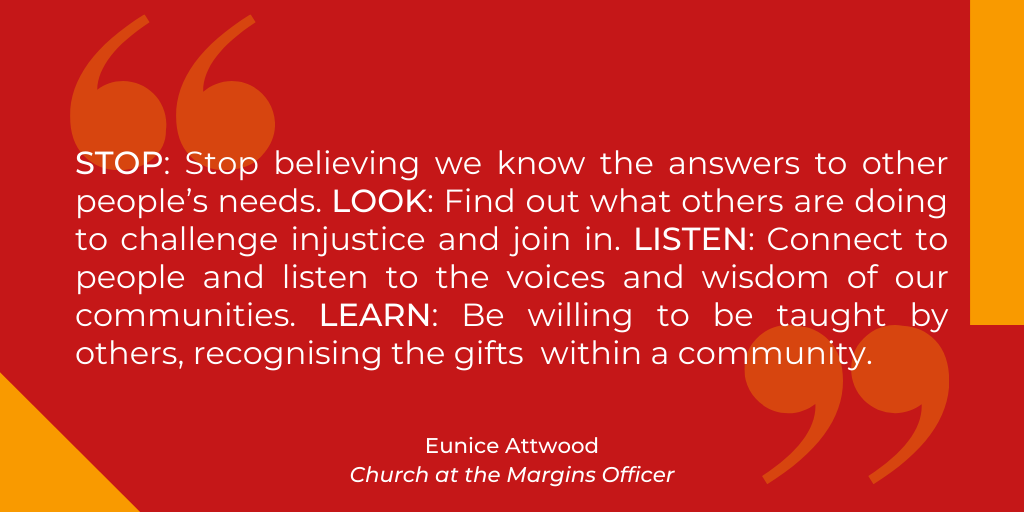

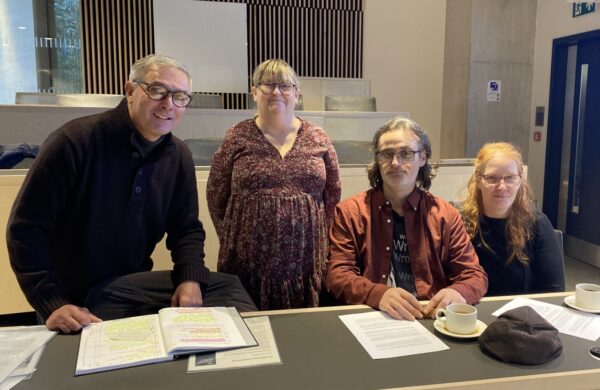
Comments (03)
Comments are closed.